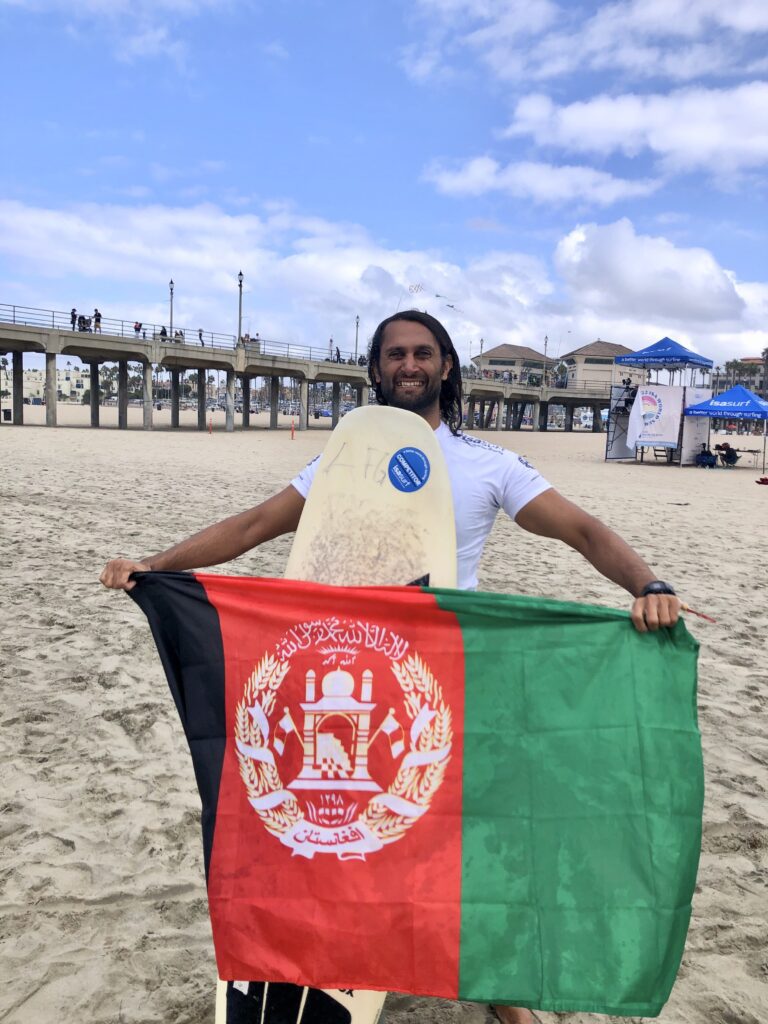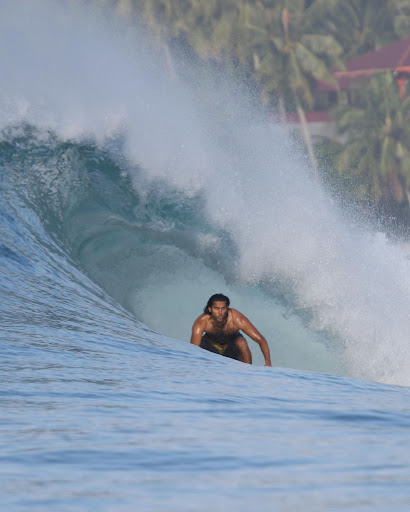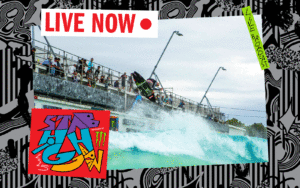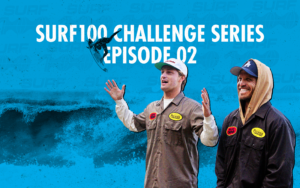Interview: Afghanistan Surf Champion Afridun Amu
From refugee to constitutional lawyer to university lecturer to Afghan surfing icon.
Afridun Amu has managed to cram three or four lifetimes of experience into thirty-five years. He was born in Kabul, Afghanistan in 1987 but soon fled the country with his family to Germany in 1992 as a political refugee. He grew up and eventually studied law, social science, and design thinking at Free University Berlin, Humboldt University Berlin and University of New South Wales Sydney (where his love of surfing blossomed). He then worked as a lawyer specializing in constitutional law before pivoting his career to work for several NGOs. If you’re catching on, the man is a wunderkind of epic proportions.
He then went on to found the innovation-focused consultancy, Kandoee, and become a research fellow for constitutional law at the Max Planck Institute for International Peace and the Rule of Law, where he led design thinking workshops with high-ranking officials in the Afghan government and served on a wide variety of projects within Afghanistan. So, now he’s a wunderkind of epic proportions that saves the world.
But most relevant to our sensibilities, the man is feverishly passionate about surfing. He founded the Wave Riders Association of Afghanistan in 2015 and has competed for Team Afghanistan at the ISA World Surfing Games since 2017. He is also the Afghanistan National Champion, having won the Afghan Surf Championship in 2015. He currently lives on the Azore Islands and surfs as often as he can. So, now he’s a wunderkind of epic proportions that saves the world–– with both Messianic hair and a propensity for walking on water.
I met Afridun this week in Huntington Beach at the 2022 ISA World Surfing Games and I was fascinated to get to know him and his story –– considering my framework of Afghanistan is shoddily constructed by a middle school reading of The Kite Runner and last year’s news headlines that all too quickly dissipated into the ether. Afridun is a popular man–– he’s tall, good-looking, bright, charismatic, and incredibly kind to everyone he comes in contact with. Everyone on the beach wanted a word or two with him. Luckily, he was more than happy to sit down for a few minutes and talk to Stab about his story and his vision for Afghanistan’s future.
Stab: We spoke earlier about how you were born in Afghanistan –– in Kabul –– and later moved to Germany. How have you stayed connected to Afghanistan and where is home now?
Afridun: It was rather easy for me to stay connected to Afghanistan because not only was I born in Afghanistan but my whole family is from Afghanistan and the only reason we left our country was due to war–– we were refugees–– at home we lived an Afghan lifestyle so to speak. We always spoke Persian, my mother tongue, we celebrated all the Afghan holidays and I had a strong connection with all my Afghan family members from around the world, even here in California. So, the Afghan identity always played a big role. Having said that, if you ask me where home is it’s a difficult question to answer because for me since I was moving all my life, starting as a small kid and still sort of moving I never, for a long long time, had a place that I would regard as home. I spent a long time in Germany, but I started to fall in love with surfing in Australia. There are many places in the world where I was comfortable but there was never a real feeling of “wow, this is where I belong”. But just recently, not even three years ago I think I found a place where I would call home, and it’s the Azores, off Portugal, in São Miguel. It’s the first time in my life where I feel like I belong somewhere, where I feel like I have a real connection.

How did you get into surfing and how did it become such an important part of your life?
I was always fascinated by the ocean, the vastness, it almost looks infinite, and especially the little energy release that we call waves. I always had that fascination and then just when I finished high school, actually pretty late, I went on a western Europe trip with friends of mine. We just finished school, we didn’t have any money whatsoever, so we were just hitchhiking our way to the ocean starting from Germany, and then in France, I happened to get a surfboard from somebody, I just took that board and went into the water and from that moment I realized, man, this is it, I was like, I fell absolutely in love with surfing in that very instant. And yeah, my surfing story started there.
I read that you studied law and are now a lecturer, what is your career now?
I used to work as a lawyer in constitutional law. I worked for an international development cooperation in Afghanistan trying to build up the rule of law over there–– good governance and state-building. But a couple of years ago I stopped working in the legal field and what I do now is work in innovation, so I do two things mainly, one is teaching at the University of Potsdam, which is close to Berlin, where I teach a class called Design Thinking, it’s an “Agile Method” class which consists of learning to be innovative, you know, how to solve complex problems, and at the same time I do consultant work.
Is there a surf community in Afghanistan right now?
Afghanistan is one of the countries with the biggest exiled population in the world. The Afghan diaspora– you will find people all over the world. Especially here in California, we have one of the biggest Afghan communities outside of Afghanistan. So, there is no surf community in Afghanistan, since it’s a very young sport in Afghanistan, probably the very first surfing that ever happened in Afghanistan occurred in 2018 when we went there for the first surf trip, there is a river wave, there is a WSL documentary called Transformed and there is another documentary called Unsurfed Afghanistan about that first surf trip. So, there isn’t a community in Afghanistan but there is a huge, well, maybe not huge, surf community of Afghans outside of Afghanistan.
And with the political climate, is the government aware that you’re representing Afghanistan? Are they happy that there is an Afghan surfing community and presence–– how do they view it?
The official authorities of Afghan sports is still the one from the last legal government. So, the current National Olympic Committee, for example, is still the one before the Taliban took over Afghanistan. I know that they [the former government] are very supportive when it comes to surfing because they see the magic, you know the joy that comes with this sport for the Afghan people. I can tell you myself the amount of support, of cheering, of hope that I felt with just competing for Afghanistan and holding the Afghan flag, was incredible. And this is something that the National Olympic Committee is aware of. Sadly, the situation in Afghanistan changed, you know, the Taliban took over, they are not officially recognized by any country or any sports entity. So this is why they aren’t the officials when it comes to surfing, but obviously they changed Afghan sports a lot the last time they [the Taliban] were in power from 1996-2001, they forbade sports completely. Football stadiums were used for executions. So, I don’t think they care a lot about surfing [laughs]. So let’s see how this progresses.
Did they compete in the Olympics during that regime?
No, during the first regime it was forbidden, there were no sports whatsoever.
Have they commented anything about Paris 2024? Are you worried that your country won’t have anybody representing Afghanistan?
Oh, I just saw a good wave there [laughs]. So, for now, for Paris 2024, the IOC still recognizes the former National Olympic Committee as the official one. So, in that regard, it should be alright. But obviously, there is currently almost no support for Afghan athletes, and it makes it difficult to properly train. But then again, Afghanistan is having so many problems that I see why sports isn’t up there on the radar.
You started the Wave Rider Association of Afghanistan–– what exactly is that? And I even read that you’re teaching refugees how to surf?
The Wave Rider Association of Afghanistan is the official governing body of Afghan surfing. It’s officially recognized by the ISA and the IOC. So that association we created to get all the Afghan surf enthusiasts together, and on one hand to be able to compete officially and on the other hand to just be together, to connect. We are all sharing sort of the same history and biography so it’s just cool to stay connected. What we’re trying to do right now is a project where we want to use the positive power of surfing to help refugees overcome some of their bad experiences. You know, surf therapy is something that people are getting more aware of, it’s something where you use that positive energy of surfing to overcome their, for example, traumatic experiences, depression, anxiety. This is something that we’re working on right now because you know there are a lot of Afghan refugees that have really bad experiences with the ocean, some of them lost friends, family members when they tried to cross the Mediterranean, for example, to get shelter, so we want to teach them how to surf, give them and show them the special magic that surfing has and at the same time support them with psychological assistance. Because surfers know how powerful surfing is when it comes to depression, anxiety and even traumatic experience, but now even science knows it. There are a lot of studies, even in Ivy League universities in the U.S. that show how powerful surfing can be. So yeah, everybody out there that is keen to support this, let us know, we are working on the finance part of it right now.
Ok, so the river waves in Afghanistan, what is the name of the river and are there specific standing waves that are consistently good?
River wave surfing isn’t such a big deal when you live by the ocean, but if you are in a landlocked country, which I think is the majority of countries in the world, obviously that is your way to go surfing. And nowadays, with new technology and discovery of static waves –– people are getting more aware of surfing as much as possible outside of the ocean. And Afghanistan has huge potential for that –– it’s a mountainous country, there are lots of rivers, and with the ice melting and snow runoff, it can produce some awesome static waves. When we went surfing in 2018 in Afghanistan there is one specific river called the Panjshir River, the reason why we went there was due to security reasons. There are many other places in Afghanistan, based on the potential of the rivers, so, hopefully once the situation in Afghanistan gets more stabilized and less intense than the way it is right now, we want to proceed with this.

So, have you been able to go back since the Taliban took over?
Not now, no. Let’s see how it goes in the future. I would love to go back to my country of origin and support it wherever I can. But for now, it’s not possible to do it.
As a foreigner, my view of Afghanistan is so vague, and it feels hard to get an objective look at the situation. But as an Afghan, what are your hopes and vision for your country?
You know, the people of Afghanistan have been suffering a lot and for a long time. There were so many different wars going on. Starting from the late ’70s. War after war, and difficult situation after difficult situation. And as sad as it is, now it is as bad as ever, you don’t hear about it so often since the American troops got out last year, it’s not in the media much anymore. But the situation is really bad right now in Afghanistan. And the worst thing right now is people are starving to death, children are dying because they don’t have anything to eat and especially winter, which is coming soon again, will be very, very bad in Afghanistan. So my wish, my hope, for the short-term right now is that there will be just enough food in Afghanistan, and food distribution, so that not so many children have to die due to starvation. But obviously, long-term I have the vision that finally things come to a rest and people can just live a normal life, this is something that everyone is dreaming of in Afghanistan right now.













Comments
Comments are a Stab Premium feature. Gotta join to talk shop.
Already a member? Sign In
Want to join? Sign Up